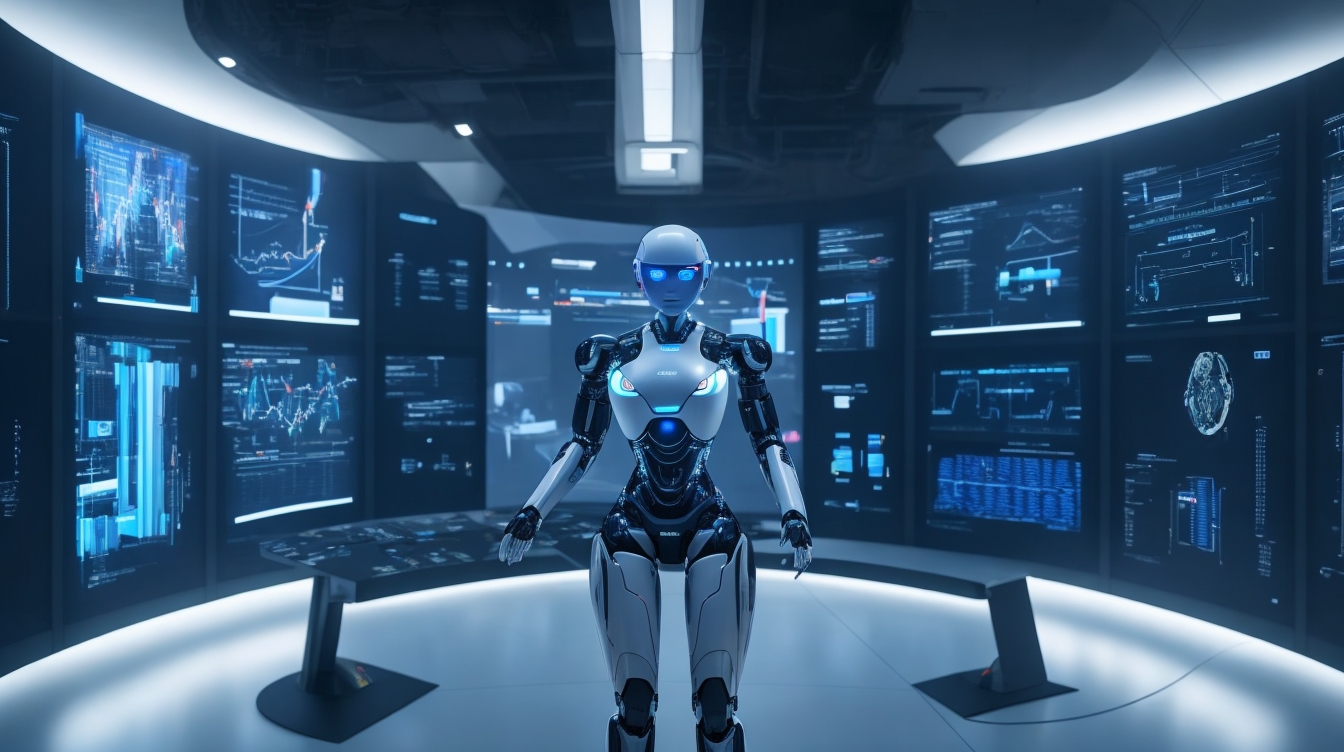With the rapid advancement of technology, artificial intelligence (AI) has become a game-changer in various industries. One such industry that has benefited greatly from AI is content marketing. AI offers powerful tools and techniques that enable content marketers to create, optimize, and personalize their content for maximum impact. In this comprehensive guide, we will explore the various aspects of AI in content marketing and its potential to revolutionize the way businesses approach their content strategies.
Understanding AI in Content Marketing
Definition and Evolution of AI in Content Marketing: Artificial intelligence, in the context of content marketing, refers to the use of advanced algorithms and machine learning to automate and enhance various aspects of content creation, strategy, optimization, and personalization. It enables marketers to analyze large amounts of data and generate valuable insights to create more targeted and engaging content.
The evolution of AI in content marketing has been remarkable. Initially, AI was primarily used for data analysis and automation. However, with advancements in natural language processing (NLP) and machine learning algorithms, AI now has the capability to generate high-quality content, identify content opportunities, optimize for search engines, and deliver personalized experiences to audiences.
Key AI Content Marketing Statistics: Before diving into the specific applications of AI in content marketing, let's take a look at some key statistics that highlight the impact and potential of AI in this field:
- According to Gartner, by 2022, 70% of enterprises will be experimenting with AI in their content marketing strategies.
- Content marketing industry leaders are 1.5 times more likely to use AI compared to their peers.
- AI-powered content has shown a 20% increase in open rates and a 70% increase in click-through rates.
- 89% of marketers believe that AI will revolutionize their content marketing strategies in the next five years.
- AI-powered chatbots are expected to save businesses $8 billion per year by 2022.
These statistics clearly indicate the growing importance of AI in content marketing and its potential to drive significant results.
The Role of AI in Content Creation
AI-Powered Tools for Content Creation: AI has revolutionized the content creation process by offering tools that can assist in generating high-quality content efficiently. Content marketers can leverage AI-powered tools like Clearscope, SEMrush, and MarketMuse, which use AI algorithms to analyze search intent, optimize content for search engines, and suggest relevant keywords and topics.
These tools not only save time and effort but also ensure that the content produced is highly relevant and valuable to the target audience. They provide insights into the performance of existing content, identify gaps or opportunities, and generate data-driven recommendations for improvement.
Natural Language Generation (NLG) in Content Creation: Another significant aspect of AI in content creation is Natural Language Generation (NLG). NLG algorithms can generate coherent, human-like content based on predefined rules and data inputs. This technology has been particularly useful in creating data-driven reports, product descriptions, and personalized email campaigns.
NLG algorithms can process large datasets, extract key information, and transform it into readable and understandable narratives. This allows content marketers to scale their content creation efforts while maintaining consistency and quality. NLG-powered tools like Wordsmith, Quill, and Articulate enable businesses to automate the generation of content, freeing up resources for other strategic initiatives.
AI and Content Strategy
Content Profiling with AI: Content profiling involves analyzing the characteristics and preferences of target audiences to create personalized and targeted content. AI plays a crucial role in content profiling by analyzing large volumes of user data, such as browsing behavior, social media interactions, and purchase history, to identify patterns and preferences.
AI-powered tools like IBM Watson, Salesforce Einstein, and Adobe Experience Cloud utilize machine learning algorithms to segment audiences based on various attributes. This segmentation allows content marketers to understand their audience better and tailor their content strategy to meet their specific needs and preferences.
AI in Competitive Analysis: AI algorithms can analyze competitors' content strategies, keywords, and performance to provide valuable insights for content marketers. Tools like BuzzSumo, Ahrefs, and Moz not only help identify top-performing content from competitors but also provide recommendations for creating better content.
By leveraging AI-powered competitive analysis, content marketers can gain a competitive edge by understanding the gaps in the market and identifying untapped content opportunities. This data-driven approach enables them to create engaging and valuable content that resonates with their target audience.
Identifying High ROI Potential Content Topics with AI: Choosing the right content topics is crucial for driving traffic, engagement, and conversions. AI-powered topic research tools like AnswerThePublic and Content Insights leverage AI algorithms to analyze search queries and identify popular topics with high potential ROI.
These tools provide content marketers with valuable insights into audience preferences, trending topics, and gaps in existing content. By utilizing AI in topic research, content marketers can focus their efforts on creating content that aligns with what their target audience is actively searching for, thus increasing the likelihood of achieving desired results.
AI in SEO and Content
Understanding Search Intent with AI: Understanding and optimizing for search intent is a key aspect of successful SEO and content marketing. AI algorithms can analyze search queries, user behavior, and context to determine the underlying intent behind each search.
Tools like Google's Natural Language Processing API, MarketMuse, and BrightEdge help content marketers decipher search intent and optimize their content accordingly. By aligning content with search intent, businesses can increase their chances of ranking higher in search engine results pages (SERPs) and attracting relevant organic traffic.
Optimizing Content for Search Engines with AI: AI-powered tools have greatly simplified the process of optimizing content for search engines. These tools analyze a range of factors, including keyword usage, content structure, readability, and backlink opportunities, to provide data-driven recommendations for optimization.
Tools like Yoast SEO, SEMrush, and Moz not only facilitate on-page optimization but also help content marketers monitor their search engine rankings, track competitors, and identify improvement opportunities. By leveraging AI in SEO, content marketers can ensure that their content is well-optimized and stands a better chance of ranking higher in search results.
Identifying Topic Clusters with AI for Improved SERP Results: Topic clusters have become an effective SEO strategy to improve organic visibility and user experience. AI-powered tools, such as MarketMuse, can analyze content, identify related topics, and suggest topic clusters to enhance content organization and relevance.
By creating interlinked content clusters, businesses can signal to search engines the depth and breadth of their expertise on a specific topic. This strategy improves crawlability and helps search engines understand the context and relevance of the content. Ultimately, this enhances the chances of achieving improved SERP results and attracting organic traffic.

Personalization with AI
Machine Learning for Audience Segmentation: AI enables content marketers to segment audiences more effectively, allowing for personalized content experiences. Machine learning algorithms analyze user behavior, preferences, and demographics to classify individuals into specific segments.
This segmentation allows content marketers to deliver personalized recommendations, product offers, and content suggestions based on each user’s specific needs and interests. Personalization powered by AI can significantly enhance engagement and improve conversion rates.
Dynamic Landing Pages for Increased Conversion Rates: With AI-powered dynamic landing pages, content marketers can deliver personalized experiences based on data-driven insights. Dynamic landing pages adapt in real-time, displaying tailored content and offers based on user behavior, demographics, and preferences.
Tools like Optimizely, Instapage, and HubSpot utilize AI to analyze user data and optimize landing page experiences. By leveraging AI to deliver dynamic landing pages, businesses can improve engagement, reduce bounce rates, and increase conversion rates.
Case Studies of AI in Content Marketing
Dynamic Content: Dynamic content allows marketers to deliver personalized content experiences based on user behavior and preferences. AI-powered tools like Dynamic Yield and Evergage enable businesses to dynamically modify content elements such as text, images, and recommendations based on user data.
Case studies have shown that dynamic content can significantly boost engagement and conversion rates. By delivering relevant and personalized content, businesses can create a more immersive and tailored experience for their audience, ultimately leading to improved results.
Chatbots: AI-powered chatbots have revolutionized customer interactions and content delivery. Chatbots can provide instant responses to customer inquiries, guide users through the sales funnel, and deliver personalized content recommendations.
Case studies have demonstrated the effectiveness of chatbots in improving customer satisfaction and generating leads. By leveraging AI in chatbot technology, businesses can automate customer support, enhance engagement, and streamline the content delivery process.
Trigger-Based Automation: AI-powered trigger-based automation enables businesses to deliver content at the right time and in response to specific user actions. By analyzing user behavior and triggers, businesses can automate the delivery of personalized content through email marketing, push notifications, and other channels.
Case studies have shown that trigger-based automation can significantly improve engagement and conversion rates. By delivering timely and relevant content, businesses can nurture leads, drive repeat visits, and increase overall brand loyalty.
Curated Email Newsletters: Curated email newsletters, powered by AI algorithms, allow businesses to deliver personalized content recommendations directly to users’ inboxes. By analyzing user preferences, browsing behavior, and interaction history, AI-powered email platforms can curate and deliver relevant content to each subscriber.
Case studies have highlighted the effectiveness of curated email newsletters in driving engagement and conversions. By leveraging AI to deliver tailored content via newsletters, businesses can build stronger relationships with their audience and increase brand loyalty.
Choosing the Right AI Tools for Content Marketing – Overview
When selecting AI tools for content marketing, it’s important to consider the specific needs and objectives of your business. There is a wide range of AI-powered tools available, each offering different functionalities and capabilities.
Some popular AI tools for content marketing include Clearscope, SEMrush, MarketMuse, IBM Watson, Salesforce Einstein, Adobe Experience Cloud, BuzzSumo, Ahrefs, Moz, Wordsmith, Quill, Articulate, Google’s Natural Language Processing API, BrightEdge, and Yoast SEO.
Features to Look for in AI Tools
When evaluating AI tools for content marketing, here are some key features to consider:
- Natural Language Processing (NLP): Look for tools that leverage NLP to analyze and understand human language, enabling more accurate insights and recommendations.
- Data Analysis and Insights: Ensure that the tool provides comprehensive data analysis and actionable insights, giving you a deeper understanding of your audience, content performance, and competitors.
- Personalization Capabilities: Look for tools that offer personalization features, allowing you to deliver tailored content experiences based on user data and preferences.
- Automation and Efficiency: AI tools should streamline and automate time-consuming tasks, such as keyword research, content optimization, and audience segmentation, freeing up resources for more strategic initiatives.
- Integration with Existing Systems: Consider whether the AI tool integrates smoothly with your existing content management, CRM, and marketing automation systems, allowing for seamless data flow and workflow.
- User-Friendly Interface: Ensure that the tool has an intuitive and user-friendly interface, making it easy for your team to navigate and utilize its features effectively.
- Scalability and Flexibility: Consider the scalability and flexibility of the tool, as your content marketing needs may evolve over time. Look for tools that can grow and adapt with your business requirements.
- Customer Support and Training: Evaluate the level of customer support and training provided by the tool’s vendor. Adequate support and training resources can help your team maximize the tool’s potential and overcome any challenges.
By considering these features and conducting thorough research, you can select the AI tools that best align with your content marketing goals and ensure a successful integration into your existing processes.
Conclusion
The future of AI in content marketing is bright. AI-powered tools and techniques enable businesses to create, optimize, and personalize their content in ways that were previously unimaginable. By utilizing AI, content marketers can gain valuable insights, deliver personalized experiences, and improve overall performance.
From content creation and strategy to SEO optimization and personalization, AI offers a wide range of applications that can enhance content marketing efforts. By leveraging the power of AI tools, businesses can stay ahead of the competition, deliver engaging and relevant content, and achieve their desired results.
As technology continues to advance, AI will undoubtedly play an increasingly vital role in content marketing. By embracing AI and staying abreast of the latest developments, businesses can position themselves for success in this ever-evolving digital landscape. Take the time to explore the AI tools available, carefully assess their features, and integrate them into your content marketing strategy for optimal results.

AI Automation Agency Services
AI Automation Agency Services play a crucial role in helping businesses create authority websites, optimize social media posts, generate feature images, and develop AI-driven apps. These services leverage AI technologies and algorithms to automate repetitive tasks, streamline workflows, and generate valuable insights, ultimately saving time and resources for businesses while enhancing the quality and effectiveness of their content marketing efforts.
Authority Websites
Building an authority website requires consistent and high-quality content creation, SEO optimization, and user engagement. AI Automation Agency Services can automate various aspects of website development and maintenance. For instance, AI-powered tools can analyze search queries, competitive data, and user behavior to identify content gaps and suggest relevant topics for blog posts and articles. This streamlines the research process and ensures that the content is tailored to meet the needs of the target audience.
Furthermore, AI algorithms can optimize website structure, meta tags, and internal linking, improving search engine visibility and organic traffic. By automating these website optimization processes, businesses can focus more on creating valuable content and engaging with their audience, thereby establishing themselves as industry authorities.
Social Media Posts
Social media plays a vital role in content marketing, allowing businesses to reach a broader audience, drive engagement, and build brand awareness. AI Automation Agency Services can assist in automating social media post creation, scheduling, and optimization.
AI-powered tools can analyze social media trends, audience preferences, and engagement patterns to suggest the best times to post content and the most effective strategies for increasing engagement. Additionally, these tools can generate relevant content ideas, suggest appropriate hashtags, and even create compelling captions, saving businesses time and effort in crafting attention-grabbing posts.
By leveraging AI automation for social media, businesses can ensure a consistent presence, engage with their audience more effectively, and drive traffic to their website or other content channels.
Feature Images
Eye-catching visuals are crucial for capturing audience attention and conveying the message effectively. AI Automation Agency Services can automate the generation of feature images for blog posts, social media content, and other marketing materials.
AI-powered image generation tools can analyze the content topic, headline, and other key elements to produce visually appealing and relevant images. These tools can incorporate design elements, text overlays, and appropriate color schemes, resulting in engaging and professional-looking images that align with the brand identity.
Automating the creation of feature images not only saves time but also ensures brand consistency and enhances the visual appeal of content, ultimately improving audience engagement and increasing the chances of content being shared across various platforms.
AI-Driven Apps
AI Automation Agency Services can also help businesses develop AI-driven apps that enhance user experiences and optimize content delivery. These apps leverage AI algorithms to analyze user behavior, preferences, and data to deliver personalized content recommendations, product suggestions, and interactive experiences.
For example, an AI-driven app can analyze user interactions with content and provide relevant recommendations based on their interests and past behavior. This level of personalization enhances user engagement and helps businesses deliver targeted content that resonates with their audience.
These apps can also leverage AI chatbot technologies to provide instant customer support, answer questions, and guide users through the content discovery process. By automating customer interactions and content delivery, businesses can improve user satisfaction, increase conversions, and build stronger relationships with their audience.
In conclusion, AI Automation Agency Services enable businesses to create authority websites, optimize social media posts, generate feature images, and develop AI-driven apps. These services leverage AI technologies to automate tasks, enhance content quality, and deliver personalized experiences. By incorporating AI automation into their content marketing strategies, businesses can improve efficiency, engage their audience more effectively, and achieve better results in an increasingly competitive digital landscape.

FAQs
How does AI revolutionise content marketing?
AI streamlines the content creation process by automating time-consuming tasks, helping businesses understand user preferences, optimising SEO, segmenting audiences, and providing valuable insights for content strategy. As a result, content marketing becomes more efficient, personalised, and data-driven.
What are the main applications of AI in content marketing?
AI has various applications in content marketing, ranging from content creation and SEO optimisation to data analysis and content strategy. Other notable applications include audience segmentation, topic clustering, competitive analysis, personalisation, dynamic content creation, and chatbot implementation.
Can AI completely replace human content creators?
While AI can automate numerous aspects of content creation and marketing, it still lacks the creativity, empathy, and understanding of human emotions that are essential for crafting engaging stories and communicating brand values. Thus, the efficient combination of AI-powered tools and human creativity is the key to a successful content marketing strategy.
What should businesses consider while choosing AI tools for content marketing?
When selecting AI tools for content marketing, businesses should evaluate features such as ease of use, data-driven insights, scalability, integration capabilities with other platforms, and the availability of a reliable support system. Additionally, it’s essential to assess if an AI tool aligns with the company’s specific needs and objectives.
Are AI-powered content marketing tools expensive?
The cost of AI-powered content marketing tools varies widely, depending on their features, complexity, and intended use. Some AI tools offer free trial periods or basic versions with limited features at no cost. However, as with any technology investment, it’s crucial to consider the potential ROI and long-term benefits provided by AI tools, as they can lead to increased efficiency, reduced workload, and improved content quality.

